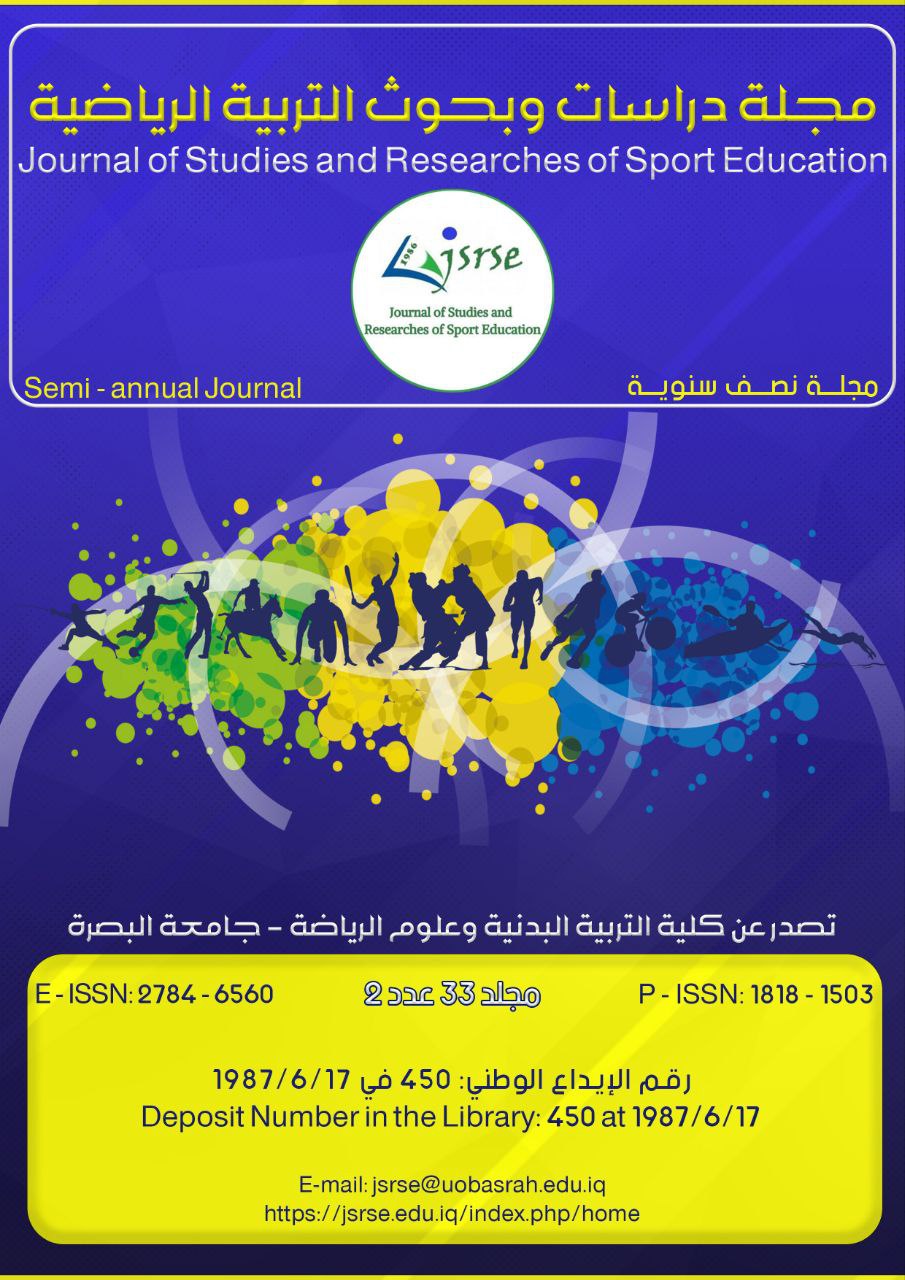interpersonal emotion regulation Regulating the personal emotions of physical education teachers and their role in sustaining the success of sports lessons in preparatory schools affiliated to the Directorate of Education of Babil Governorate from their point of view
Main Article Content
Abstract
The research aimed to: - Build two tools, one of which measures the regulation of personal feelings of physical education teachers in middle schools affiliated with the Babil Governorate Education Directorate from their point of view, and the second measures the sustainability of success of sports lessons in preparatory schools in Babil Governorate from the point of view of its teachers. - Determining the level of sustainability of success of sports lessons in middle schools affiliated with the Babil Governorate Education Directorate from the point of view of physical education teachers. The researcher used the descriptive approach in both survey and correlational methods. The research community was limited to physical education teachers in the middle schools affiliated with the Babil Governorate Education Directorate, who numbered (210). (a teacher, and the researcher chose the main research sample from all members of the research community using a comprehensive enumeration method. The exploratory sample included I had (10) teachers, while the construction sample included (120) teachers, and the application sample included (80) teachers. In order to collect data, the researcher built a tool to measure the regulation of personal emotions for physical education teachers, as well as a tool for sustaining success for sports lessons in
Article Details

This work is licensed under a Creative Commons Attribution-NonCommercial 4.0 International License.
References
Aldewan, L. H., Jaber salam, & Yassin, S. (2016). The effect of the impact of the use of guided discovery method to teach some skills in epee fencing game . Journal of Studies and Researches of Sport Education., 49, 11–25. https://www.iasj.net/iasj/article/126002
Argüden, Y., Ilgaz, P., Kilitçioğlu, H., & Erimez, E. (2021). Sustainable Success. In ARGE Consulting Publications: Vol. First publ. https://doi.org/10.12968/s0261-2097(22)60390-3
Day, C. (2005). Sustaining success in challenging contexts: leadership in English schools. Journal of Educational Administration, Vol. 43(Iss 6), 573–583.
Madrid, H. P., Niven, K., & Vasquez, C. A. (2019). Leader interpersonal emotion regulation and innovation in teams. Journal of Occupational and Organizational Psychology, 92(4), 787–805. https://doi.org/10.1111/joop.12292
Mccann, J., & Holt, R. A. (2010). Defining sustainable leadership. International Journal of Sustainable Strategic Management, 2, 204.
Mohammmad, & Abdulaziz. (2017). The effect of cooperative learning complementary and peers in learning and developing some technical skills and in badminton . Journal of Studies and Researches of Sport Education , 48, 11–30. https://www.iasj.net/iasj/article/112903
Thiel, C., Griffith, J., & Connelly, S. (2015). Leader–Follower Interpersonal Emotion Management: Managing Stress by Person- Focused and Emotion-Focused Emotion Management. Journal of Leadership & Organizational Studies, Vol. 22(1), 5–20.
Vasquez, C. A., Madrid, H. P., & Niven, K. (2021). Leader interpersonal emotion regulation motives, group leader–member exchange, and leader effectiveness in work groups. Journal of Organizational Behavior, 42(9), 1168–1185. https://doi.org/10.1002/job.2557
Vasquez, C. A., Niven, K., & Madrid, H. P. (2020). Leader Interpersonal Emotion Regulation and Follower Performance. Journal of Personnel Psychology, 19(2), 97–101. https://doi.org/10.1027/1866-5888/a000249
Worley, C. G., & Lawler, E. E. (2010). Built to change organizations and responsible progress: Twin pillars of sustainable success. In Research in Organizational Change and Development (Vol. 18, pp. 1–49). https://doi.org/10.1108/s0897-3016(2010)0000018005





 IASJ
IASJ CC-BY-4.0
CC-BY-4.0 turnitin
turnitin ISSN
ISSN DOAJ
DOAJ Crossref
Crossref GoogleScholar
GoogleScholar Orcid
Orcid